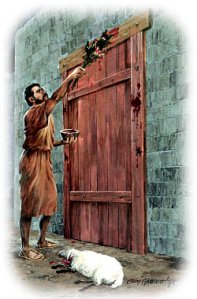The book of Exodus has always been one of my favorite books of the Bible. And even though it’s not totally historically accurate, I have seen the Prince of Egypt enough times that I could recite it. While trying to come up with a topic for this blog I had a lot of ideas going through my head. However, I decided to research the meaning of the Israelites marking their door frames with the lamb blood.
In the Old Testament when the Hebrews would sacrifice a lamb because they are said to be pure and innocent creatures. They did this as a way to compensate for their sins. A day known as Yom Kippur. John 1:29 reads “Look, the Lamb of God, who takes away the sin of the world!” The blood of the lamb is symbolic of Jesus. It foreshadows the shedding of Christ blood because he was without sin.
What was significant about putting the blood on the door?
God’s command to put the blood on the door was not concentrated on who was or was not a believer in Christ, but a matter of obedience. The Bible says in Ephesians 6:1-3 “Children, obey your parents in the Lord, for this is right. 2 “Honor your father and mother”—which is the first commandment with a promise— 3 “so that it may go well with you and that you may enjoy long life on the earth.” This can be alluded to those who did not heed to the Lord’s request were punished by the death of their firstborn. He showed them that if they listen to him then they will be protected by him and blessed with life. This was the last of the ten plagues sent to punish the Pharaoh for not letting the Hebrews go.
What happened to those that did not put the lamb’s blood on the doorframe?
The Hebrews were told for each family to sacrifice a lamb and put the blood on the side and top of the door frames as a sign of rebellion to the Egyptians. That night, the Angel of Death would come down and pass over their homes and smite the firstborn of those that did not obey.
The Passover
Passover is observed by the Jewish religion and is considered one of the most important moments in their development of the Jewish people. It recalls their slavery in Egypt and how they were set free. One source I read translated “pass over” in Exodus 12:13 in two different ways. First, God says that he will pass over the land of Egypt that night and strike all the firstborn children, both man and beast; and execute judgement. But then promises to “pass over” the homes of the ones that trusted in him to protect them from the plague of death: “The blood shall be a sign for you, on the houses where you are. And when I see the blood, I will pass over to you, and no plague will befall you to destroy you, when I strike the land of Egypt.” In other words, when God would see the blood of the Passover lamb, he would pass over to enter the house and “cover” its occupants from the judgement of death. They also were made to prepare and serve the lamb a certain way that is recognized in modern Passover meals today.
More information on Passover can be found here: http://endtimepilgrim.org/passover.htm
The Passover historically marks Moses being able to lead his people out of Egypt to the promised land.

